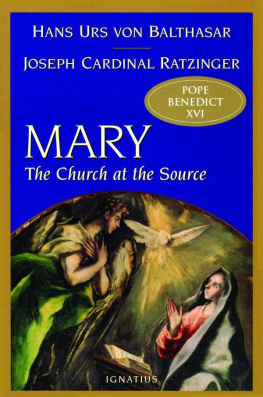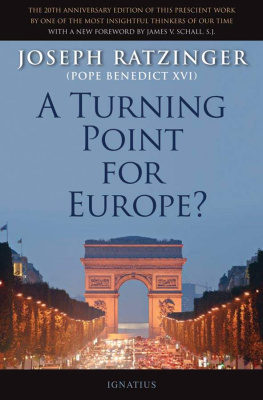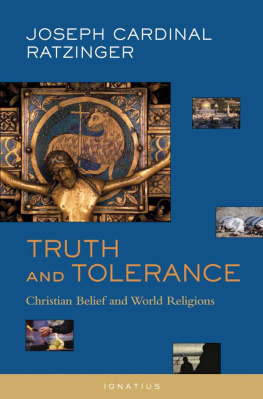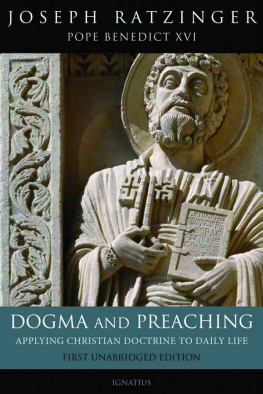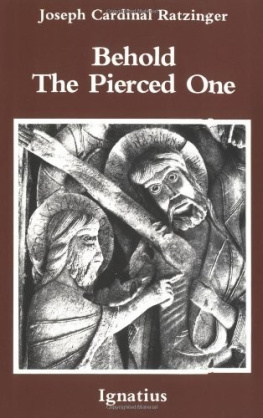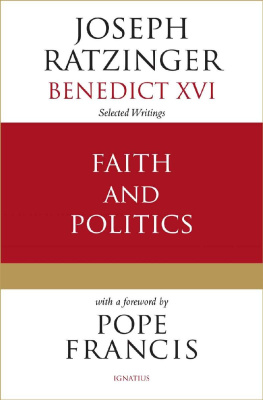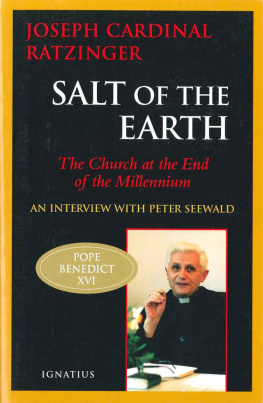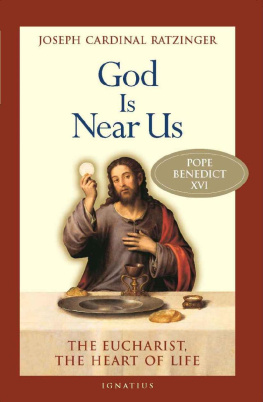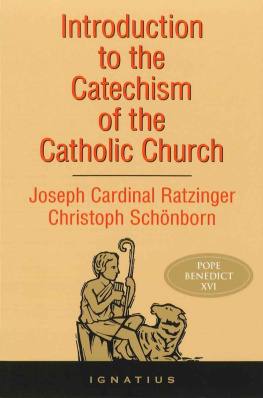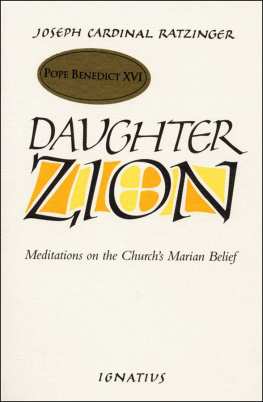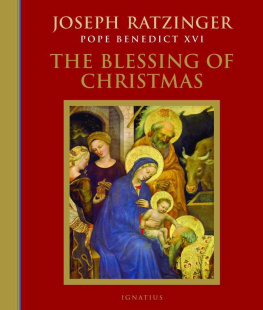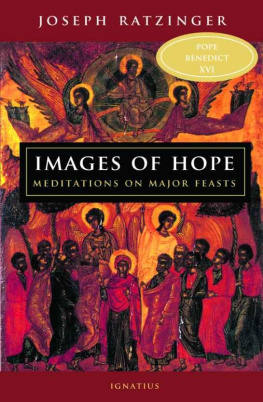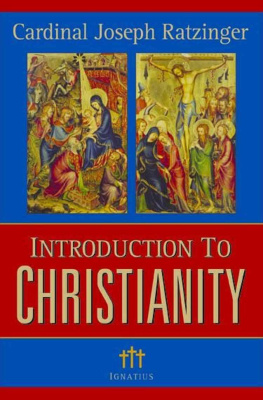Joseph Cardinal Ratzinger - Mary: The Church at the Source
Here you can read online Joseph Cardinal Ratzinger - Mary: The Church at the Source full text of the book (entire story) in english for free. Download pdf and epub, get meaning, cover and reviews about this ebook. year: 0, genre: Religion. Description of the work, (preface) as well as reviews are available. Best literature library LitArk.com created for fans of good reading and offers a wide selection of genres:
Romance novel
Science fiction
Adventure
Detective
Science
History
Home and family
Prose
Art
Politics
Computer
Non-fiction
Religion
Business
Children
Humor
Choose a favorite category and find really read worthwhile books. Enjoy immersion in the world of imagination, feel the emotions of the characters or learn something new for yourself, make an fascinating discovery.
- Book:Mary: The Church at the Source
- Author:
- Genre:
- Year:0
- Rating:4 / 5
- Favourites:Add to favourites
- Your mark:
- 80
- 1
- 2
- 3
- 4
- 5
Mary: The Church at the Source: summary, description and annotation
We offer to read an annotation, description, summary or preface (depends on what the author of the book "Mary: The Church at the Source" wrote himself). If you haven't found the necessary information about the book — write in the comments, we will try to find it.
Joseph Cardinal Ratzinger: author's other books
Who wrote Mary: The Church at the Source? Find out the surname, the name of the author of the book and a list of all author's works by series.
Mary: The Church at the Source — read online for free the complete book (whole text) full work
Below is the text of the book, divided by pages. System saving the place of the last page read, allows you to conveniently read the book "Mary: The Church at the Source" online for free, without having to search again every time where you left off. Put a bookmark, and you can go to the page where you finished reading at any time.
Font size:
Interval:
Bookmark:
MARYTHE CHURCH AT THE SOURCE
JOSEPH CARDINAL RATZINGER
HANS URS VON BALTHASAR
AT THE SOURCE
Translated by
Adrian Walker
A COMMUNIO BOOK
IGNATIUS PRESS SAN FRANCISCO
Original German edition:
MariaKirche im Ursprung
1980 by Herder Verlag, Freiburg im Breisgau
This translation was made from the fourth, revised German edition
1997 by Johannes Verlag, Einsiedeln, Freiburg im Breisgau
(a posthumous edition for Hans Urs von Balthasar)
Cover art: The Annunciation (detail)
El Greco (1541-1614)
Church of Charity, Illescas, Spain
Scala / Art Resource, New York
Cover design by Roxanne Mei Lum
Libreria Editrice Vaticana
Herder Verlag, Freiburg
Johannes Verlag Einsiedeln, Freiburg
2005 Ignatius Press, San Francisco
All rights reserved
ISBN 978-1-58617-018-9
Library of Congress Control Number 2005928503
Printed in the United States of America
CONTENTS
FOREWORD
The name of the Virgin Mary occurs in the middle of the Apostles Creed, which says that she conceived the Son of God by the Holy Spirit. The name Pontius Pilate, although it likewise attests to the historicity of Jesus earthly life, appears only in the later Nicene Creed. The Virgin Birth is, as one would expect, primarily a christological statement: Jesus is the Son of the eternal Father in such a unique sense that he could not have a second, earthly father. This austere, sober claim about the Son does not immediately suggest any special veneration of the Mother, and such veneration is not the motive for her insertion into the Creed. In the course of the Churchs history, this devotion to the Mother of Jesus, which arose on account of her unique place in the work of salvation, experienced an enormous flowering and occasionally took on exuberant forms. It is therefore salutary to keep constantly in mind its simple, christological starting pointnot in order to abolish it, but in order to situate it properly. God has regarded the low estate of his handmaiden in order to do in her those great things that he promised to Abraham and to his posterity, as Mary herself says in her paean to grace. But for this very reason, her Yes to the angel recapitulated (while raising to a new level) the whole Abrahamic faith of the Old Testament, together with the hope that it entails. It thereby signaled the incorporation of the Old Testament into the New, of Judaism into the Church. Moreover, this is necessary if Gods saving work is to maintain its unity without suffering any internal division. He has helped his servant Israel, in remembrance of his mercy, sings Mary in the Magnificat, thereby opening great vistas of hope that God will accomplish the work of the worlds salvation through Israel-Church. The Woman of the Apocalypse (Rev 12), who bears the Savior in the pains of childbirth, is the indivisible unity of Gods entire community of salvation: Israel-Mary-Church. It is within this overarching framework that we must resituate every esteem for, and veneration of, the Virgin who conceives of the Spirit.
Hans Urs von Balthasar
I
MY WORD SHALL NOT RETURN TO ME EMPTY!
Reading: Isaiah 55:10-11
Gospel: Matthew 6:7-15
Dear brothers in the episcopate,
Dear brothers and sisters in the Lord!
My word shall not return to me empty! When the prophet Isaiah spoke these words, he was hardly stating the obvious. Rather, he was contradicting what were most likely the expectations of his listeners. The verses of the reading belong in the context of Israels history of sorrows, in which God repeatedly calls his people in vain, in which his word remains fruitless, in which God appears on the stage of historybut not as a victor. All the signs he has performedthe miracle at the Red Sea, the inauguration of the royal period, Israels return from exilecome to nothing. Gods seed in the world seems ineffectual. The word God speaks in todays text thus comes in the midst of a cloud of darkness as an encouragement to all who still believe in Gods power; who believe that the world is more than rocky ground in which the seed finds no room to take root; who believe that the world is still something more than shallow soil where the sparrows of banality immediately peck away any seed that falls into it (cf. Mk 4:1-9).
For us Christians, these words are a promise of Jesus Christ, in whom the Word of God really penetrated the earth and became bread for us all. He is the seed that bears fruit through the centuries, the fruitful answer in which Gods speech has taken living root in this world. The mystery of Christ is almost nowhere so palpable and intimately connected with the mystery of Mary as in the perspective of this promise. When the text says that the word, or the seed, bears fruit, it means that, unlike a ball that hits the ground and bounces back up, the seed actually sinks into the earth, assimilates the earths energies, and changes them into itself. It thus brings about something truly new, for now it carries the earth in itself and turns the earth into fruit. The grain of wheat does not remain alone, for it includes the maternal mystery of the soilMary, the holy soil of the Church, as the Fathers so wonderfully call her, is an essential part of Christ. The mystery of Mary means precisely that Gods Word did not remain alone; rather, it assimilated the otherthe soilinto itself, became man in the soil of his Mother, and then, fused with the soil of the whole of humanity, returned to God in a new form.
The Gospel, by contrast, seems to be talking about an entirely different subject. The text speaks of how we should pray, of the right form and content of prayer, of the right way of acting, and of the right kind of interiority in prayer. It speaks, in other words, not of what God does, but of what we men do in relation to him. The truth of the matter is that there is an intimate connection between the two readings. One could even say that the Gospel explains how men can become fruitful soil for Gods Word. They can become this soil by providing, as it were, the organic elements in which life can grow and mature; by drawing life themselves from this organic matter; by becoming themselves a word formed by the penetration of the Word; by sinking the roots of their life into prayer and thus into God.
Our Gospel reading thus has a point of contact with the initiation into the mystery of Mary that Saint Luke gives us when he says in several passages that Mary kept the words in her heart (2:19; 2:51; cf. 1:29). Mary was, so to say, the confluence of the streams of Israel; in prayer she bore the misery and grandeur of its history and so enabled it to become fertile soil for the living God. Of course, prayer, as the Gospel tells us, involves considerably more than prattling, than mere talk. To be soil for the Word means that the soil must allow itself to be absorbed by the seed, to be assimilated by the seed, to surrender itself for the sake of transforming the seed into life. Marys maternity means that she willingly places her own substance, body and soul, into the seed so that new life can grow. When Luke says that a sword shall pierce her soul (Lk 2:35), he means much more than some kind of torment. He means something much more profound and much greater: Mary makes herself entirely available as soil; she lets herself be used [ brauchen ] and used up, in order to be transformed into the One who needs [ braucht ] us in order to become the fruit of the earth.
Todays Liturgy of the Hours says that we must become a longing for God. The Fathers of the Church say that prayer, properly understood, is nothing other than becoming a longing for God. In Mary this petition has been granted: she is, as it were, the open vessel of longing, in which life becomes prayer and prayer becomes life. Saint John wonderfully conveys this process by never mentioning Marys name in his Gospel. She no longer has any name except the Mother of Jesus. It is as if she had handed over her personal dimension, in order now to be solely at his disposal, and precisely thereby had become a person.
Next pageFont size:
Interval:
Bookmark:
Similar books «Mary: The Church at the Source»
Look at similar books to Mary: The Church at the Source. We have selected literature similar in name and meaning in the hope of providing readers with more options to find new, interesting, not yet read works.
Discussion, reviews of the book Mary: The Church at the Source and just readers' own opinions. Leave your comments, write what you think about the work, its meaning or the main characters. Specify what exactly you liked and what you didn't like, and why you think so.

